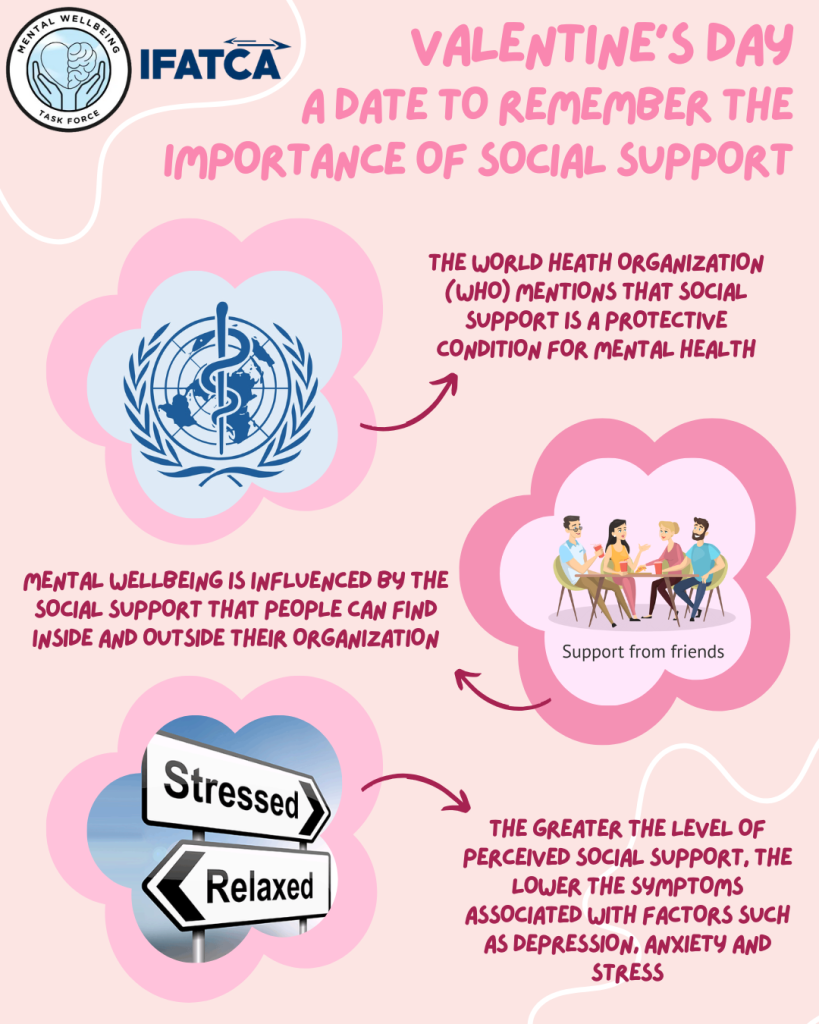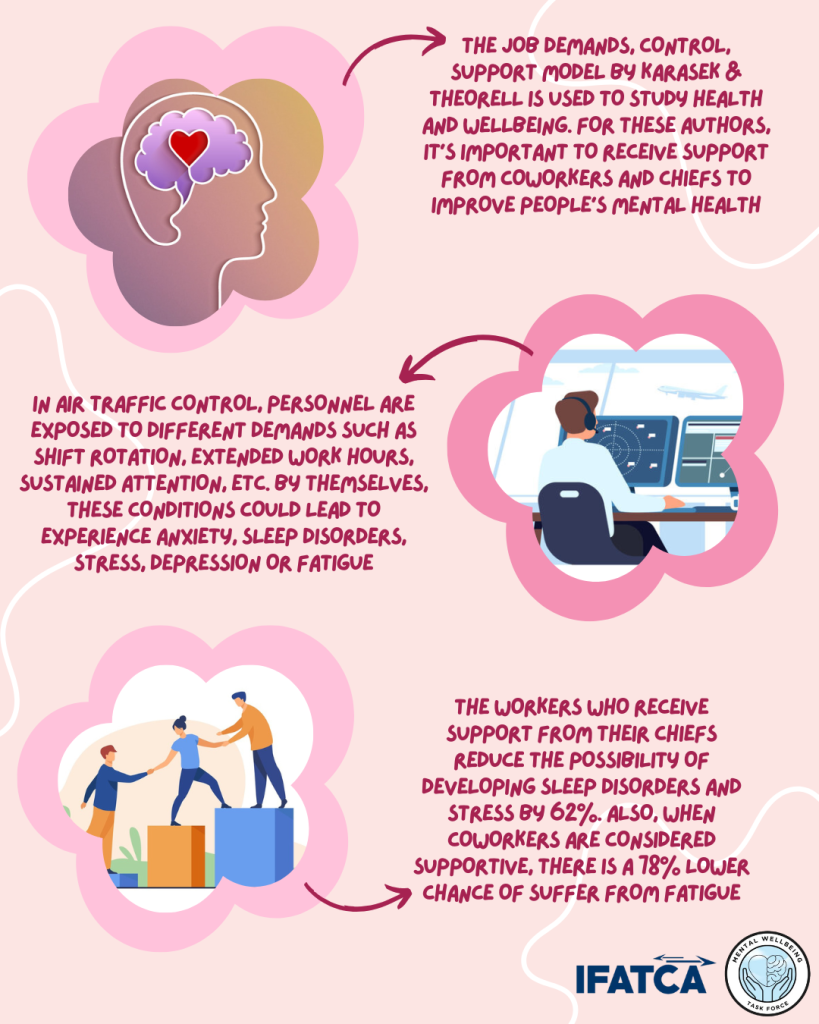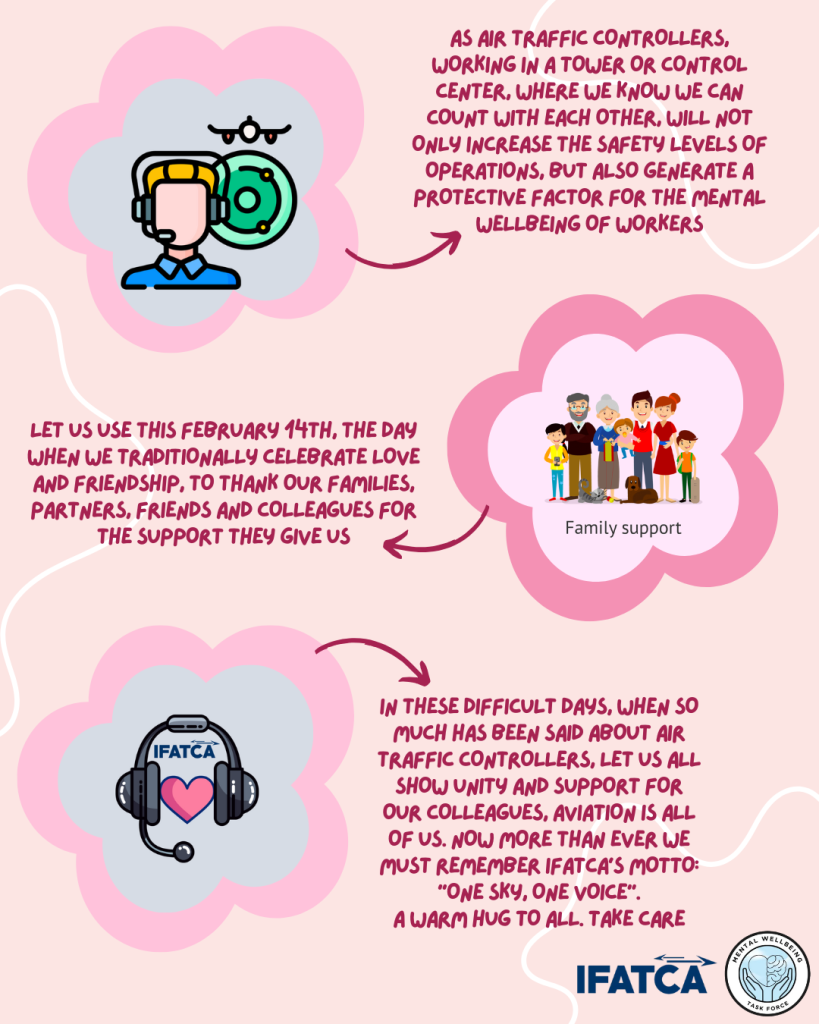by Marco Antonio Méndez López
Air Traffic Controller, Aviation Psychology Specialist and member of the IFATCA Mental Wellbeing Task ForceThe work of an air traffic controller sometimes involves facing long working hours, which can lead to different health issues. However, there are various strategies to face this demand that allows people to reach a state of wellbeing. One of these is having the support of friends, family, a partner, and even coworkers. This is known as social support.
In occupational health, there is a model proposed by Robert Karasek and Töres Theorell called “The Job Demands, Control, Support Model”, published in the early 90s. This is widely used to study health and wellbeing, both physical and mental. This model describes how the level of control that a person has over the pace of work and the demands placed on them, determines their state of wellbeing, added to the social support that they can find.
These authors remind us of the importance of receiving support from coworkers and superiors to improve people’s mental health. In air traffic control, personnel are exposed to different demands such as shift rotation, extended work hours, sustained attention and decision-making process in a short time, among others.
By themselves, these conditions could lead to anxiety, sleep disorders, stress, depression, musculoskeletal disorders, fatigue, and other health issues. However, Karasek & Theorell explain in their model that a possible way of tackling these factors is to have good social support.
February 14th has been adopted worldwide as a celebration of love, but in some countries this day is also used to celebrate friendship. love and friendship can go so much further, they can also come from the support that our coworkers give us.
The World Heath Organization (WHO) mentions that social support offers protection for mental health, and the lack of solidarity and recognition among workers is often associated with sleep disorders, stress and fatigue1. For example, in Latin America, research showed that the workers who receive support from their superiors were 62% less likely to develop sleep disorders and stress. Also, when coworkers are considered supportive, there is a 78% lower chance of suffering from fatigue2.

This information demonstrates the importance of support and solidarity from colleagues and bosses at work, but it also extends to our homes. It is important that, in addition to inherent pressure from working in aviation, we find support at home to act as protection for our mental health. For example, it has been demonstrated that an unequal distribution of household tasks and where there is no perceived support from other family members can be a possible source of stress and depression3.
Mental health and wellbeing are influenced by both job demands and interpersonal relationships, such as the social support that people can find inside and outside their organization4. It is said that the greater the level of perceived social support, the lower the symptoms associated with factors such as depression, anxiety and stress5.

Another reason to pay attention to social support is that for workers who provide a service and may have to deal with difficult and/or disrespectful users, it becomes important to create work teams that are characterized by values such as commitment, solidarity and, above all, unity. Adding this to good training, will allow workers to reach a state of wellbeing that could increase their performance, improve the service that is provided to different users and reduce reported symptoms of sleep disorders and anxiety as well as substance abuse6.
As air traffic controllers, working in a tower or control center, where we know we can count on each other, will not only increase the safety levels of operations, but also provide protection for the mental wellbeing of workers. It is important that the different air traffic service providers (ANSPs), create policies that allow better interaction and reinforce cooperation, and that, each one of us does our part to generate a better work environment.

Let’s use this February 14th, the day when we traditionally celebrate love and friendship, to thank our families, partners, friends and colleagues for the support they give us. Those who are always willing to listen to our problems and concerns, fears and worries, those who are interested in knowing if we had a good or a bad day. Thank you to those who, when we finish a shift, are there for us and with a hug or words of encouragement, to “recharge” our energy. Without you, we could not do the work that we do.
In these difficult days, when so much has been said about air traffic controllers, let us all show unity and support for our colleagues, aviation is all of us. Now more than ever we must remember IFATCA’s motto: “One Sky, One Voice”. A warm hug to all. Take care.
____________________
References
1 Wilkinson, R & Marmot, M. Social determinants of health: The solid facts. World Health Organization, Regional Office for Europe [2nd ed.]; 2003. Available from: https://iris.who.int/handle/10665/326568
2 Mendez-Lopez, MA. Salud en los Trabajadores de Servicios a la Navegación en el Espacio aéreo Mexicano (SENEAM). Metropolitan Autonomous University [Master’s Thesis]; 2022. Available from: https://repositorio.xoc.uam.mx/jspui/handle/123456789/24809
3 Lazarevich, I & Mora-Carrasco, F. Depresión y género: Factores psicosociales de riesgo. Health Problem Journal 2(4); 2009. Available from: https://saludproblemaojs.xoc.uam.mx/index.php/saludproblema/article/view/99
4 Gomez-Velez, MA & Calderón-Carrascal PA. Salud mental en el trabajo: Entre el sufrimiento en el trabajo y la organización saludable. Katharsis Journal 23(2); 2017. Available from: https://doi.org/10.25057/25005731.871
5 Barrera-Herrera, A et al. Apoyo social percibido y factores sociodemográficos en relación con los síntomas de ansiedad, depresión y estrés en universitarios chilenos. Journal of psychopathology and clinical psychology 24(2); 2019. Available from: https://doi.org/10.5944/rppc.23676
6 Ansoleaga, E & Ahumada, M. Factores de riesgo y protección para la salud mental de trabajadoras/es de salud pública postcatástrofes. Praxis: Journal of Psychology 34(2); 2020. Available from: https://dialnet.unirioja.es/servlet/articulo?codigo=7839434



